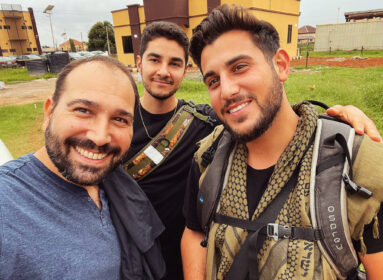By Cindy Mindell
In Jewish observance, it is traditional to delay a boy’s first haircut until his third year. For many, the ritual reflects Torah-based comparisons between human life and the growth of trees; Leviticus prohibits the consumption of tree-fruit until the tree is three years old. It is hoped that, like a tree, the boy will continue to grow in his Jewish wisdom and engagement.
In the case of Chai Mitzvah, a national program launched in Greater Hartford in 2009, year three has been one of tremendous growth, says executive director Audrey Lichter. The initiative has proliferated to nine cities throughout the U.S. and to several communities in Israel, through a widening organizational network and variety of models.
Chai Mitzvah was conceived by Scott Shay, a Jewish philanthropist and business leader in New York City, and author of “Getting Our Groove Back: How to Energize American Jewry.” Four years ago, he hired Lichter, a veteran Jewish educator, to design a “synagogue-enhancement” program that could eventually go national.
The founding concept was to encourage Jews to revisit and recommit to Jewish life every 18 years after bar-/bat-mitzvah age — 31, 49, 67, and 80. During its pilot year, the program was embraced by all Hartford-area Jewish congregations, with participants guided by local educators and mentors, and a year-long curriculum based on the Jewish calendar.
After a second year using the same synagogue-based model in several communities, Chai Mitzvah organizers used feedback to revise their model. “The rabbis were saying that the ages were a problem; they were turning people away who wanted to participate but who had to wait, and that felt uncomfortable,” Lichter says. “We wanted to make it accessible to people, because the first time they do it, they love it so much and know how to do it and can do it again at various stages of their lives.”
Now the program is open to anyone at any age, and offered not only through synagogues but via self-organized affinity groups as well – such as Lion of Judah women philanthropists affiliated with Jewish Federation of Greater Hartford. Even individuals in small or non-existent Jewish communities can be mentored online. The eight-month curriculum still revolves around the Jewish calendar year and participants’ personal goals and commitment to a Jewish ritual, but each group can tailor and rework the curriculum to reflect its particular focus, plugging into existing local Jewish-learning and social-action resources to fulfill program requirements. Each group has its own blog, with the ability for participants to interact online in a worldwide virtual community.
The curriculum covers one topic per month, including adult rites of passage, tzedakah and philanthropy, interpersonal relationships, mindfulness and living in the present, personal meaning of the Passover seder, days of remembrance, gratitude, Judaism and ecology, and Israel. Instructors and mentors are funded through grants from individuals and private foundations, as well as the Jewish Community Foundation of Greater Hartford and UJA-Federation of New York. A fundraiser is hosted every two years at NASDAQ in New York. There is no cost to host organizations; each participant pays $36 for materials.
Chai Mitzvah is building collaborations with larger Jewish organizations, including the Limmud NY Jewish learning network, the Jewish National Fund, and RAVSAK, the Jewish community day school network, which is piloting the program with 10 schools as engagement outreach to parents. Taglit-Birthright Israel NEXT is consulting with Chai Mitzvah on ways to help 20-somethings stay connected Jewishly. A national board is being developed to reflect the program’s growing presence.
“We now have more than 300 Chai Mitzvah participants, and it’s so gratifying to see how people set their personal goals, how they shape their participation, and how much they appreciate the opportunity to do so,” says Lichter. “Most communities are full of opportunities for learning and engagement; our focus is on energizing and engaging the Jewish people living in these communities.”
In Israel, the program has just completed its pilot year as “Masa Chai,” coordinated by former West Hartford resident, Yosefa Drescher, who served as a Chai Mitzvah mentor at Beth David Synagogue in West Hartford and returned to Israel last year.
“If an American Jewish program is serious, it needs to have some connection to Israel,” syas Drescher. “If you can have the program in both countries, it makes for a more energetic and successful effort. Because I’m in both cultures, I see it as my calling to connect the two communities which is essential for both.”
Masa Chai fits into what many refer to as a “Jewish Renaissance” in Israel, an open-minded, non-denominational, pluralistic burgeoning, inspired by the assassination of Yitzchak Rabin in 1995, that widens Jewishness far beyond only Orthodox and secular. With funding from UJA-Federation of New York, the Jewish Community Federation San Francisco, and the AviCHAI Foundation, the program was launched last October with 20 residents of the Hefer Valley in central Israel, a collective of kibbutzim, farming communities, and communal settlements overseen by a regional council. While several Jewish-education programs already existed in the community, Masa Chai added in the components of ritual and social action.
Next year, in addition to the current group, Drescher will help establish four new groups, including one for women from the Former Soviet Union in Nazareth Illit, and another in a non-denominational chavurah in Gan Yavne, a small town near Ashdod. A resident of Raanana, Drescher also plans to expand the program for parents of the community’s TALI schools, a non-Orthodox religious public school system.
“In Israel, our grandparents pushed away Jewish ritual, our parents knew something but not a lot, and now we’re asking, what do we want our children to know?” Drescher says. “The Jewish Renaissance is about bringing Judaism back into Israel. Masa Chai can help people feel more connected to the community, to the country, and to Judaism. If we succeed, I will feel that I will get a small place in heaven.”
Comments? Email cindym@jewishledger.com.









 Southern New England Jewish Ledger
Southern New England Jewish Ledger













